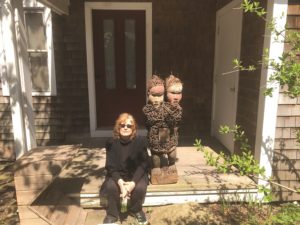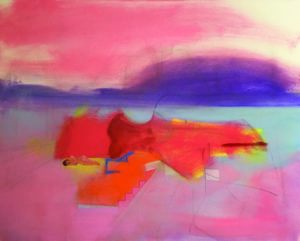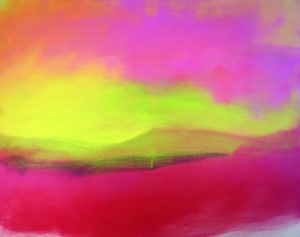When we enter this world as newborns, we experience our surroundings visually as forms, shadows, and, gradually, shades of color. We recognize our mother’s face before all else, then become accustomed to the lines, contours, and hues around us. Without much thought, we seek patterns in what we see and assign them to familiar objects — a house, a birch tree, someone we know picking up a shell on the beach.

What would happen, however, if we, as adults, tried to see the same shapes, lines, and colors purely in terms of their composition and relation to one another? What if we looked over the sea, for example, and instead of identifying sand, waves, and a lone sailboat, we just experienced planes of different colors meeting, and shapes appearing at that point of convergence? This is the realm of vision, Provincetown painter Sky Power says, from which abstract art is born.
“People ask me of my paintings: ‘What is this?’ or ‘What is this supposed to be?’ And I tell them, ‘It is what you are experiencing now,’ ” Power says. “Abstract art is emotional. You connect to it from an emotional place.”
Over a lifetime of creating art and studying with local masters, Power’s paintings have become increasingly abstract. “I do like to do very concise, representational work as well,” she says. “But that is not my focus.” She considers abstract art to be a bridge between the material and spiritual worlds. “When I make art, I open up to something much larger than myself,” she says. “I call it ‘source’: my oneness with humanity, all species, nature, and the universe.”
A Texas native, Power found her way to Provincetown in her early 20s. “I arrived here in 1976 to launch a horse-and-carriage business, and discovered a vibrant art colony,” she says. “I was drawn to this beautiful landscape by the sea, and the safe haven of a gay community that was part of a culture of artists and fishermen.”
Power has been represented by the Berta Walker Gallery since 2004, and she is scheduled to have an exhibit of her work there, along with that of Paul Resika and Michael Carroll, from Aug. 7 to 20. She’s also scheduled to teach a class in “Abstraction as Form” at the Provincetown Art Association and Museum from Aug. 17 to 19. But the fate of all planned events is unknown during the coronavirus crisis, and for now, Power is holed up in her Provincetown home.
She describes doing abstract work as expansive and freeing. She’ll sometimes combine abstract forms with representational elements to show the connection between them. Having worked over the years as a piano tuner, a carpenter, and, most recently, a phlebotomist at Quest Diagnostics in Provincetown, she values concise, analytical focus in art as much as the loose expressiveness of abstraction. Both, she says, are necessary to her process.
“First, I mix a large batch of the color that I feel most connected with that day,” Power says. “On a blank canvas, I start off painting with what I call ‘free abandon.’ Once I achieve a form that I want to keep, I set the painting aside to dry — I work in oils. I generally work on several paintings during the same time period, for weeks or months. At a certain point, the process becomes very deliberate and analytical.”
Power retired shortly before the Covid-19 epidemic shut everything down. “I am going to be 69 soon, and I realized that I needed to focus solely on my art. This is really what we are all doing now, thinking about time: How am I spending my time? How much time do I have left? For me, this happened pre-virus.”

For the past months, Power has been working on paintings that are “important and specific to what is going on right now,” she says. “In my piece Dreaming of a New World, our new future is abstract. That’s what we’re doing when we are painting abstractly — we are dreaming of something new. That is hopefully what is happening right now. We are creating a new world.”
In the painting, Power added a human figure “in the middle of a diffused landscape to convey the idea of a dream,” she says. “Because she is painted in similar color tones, your eyes do not immediately go to the figure. I wanted the viewer to experience the dream first, then come upon her and realize that she is the dreamer. And I wanted her to be indigenous, because these are the roots that we, as a species, need to get back in touch with.” She adds: “I am part Cherokee.”

Another recent painting, titled Shifting Sands, “conveys the beauty I am surrounded by here, connecting with the mystical qualities in the Cape light,” Power says. “But more importantly, it is a metaphor for humanity’s need to save our planet and our species. The Covid-19 virus has temporarily, globally stopped humans from continuing with the life structures that we have created. This is an opportunity for us to reflect on who we are and who we could be. This is our time for reflection, our time for change.”



